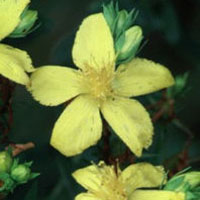Penn Herb Wellness Guide
St. John’s Wort for Weight ControlFind Products
 © Steven Foster
© Steven FosterHow Much Is Usually Taken by Dieters?
The standard recommendation for mild to moderate depression is 500 to 1,050 mg of St. John’s wort extract per day.1, 2, 3 Length of use should be discussed with a healthcare professional.
Side Effects
St. John’s wort has a low incidence of side effects compared to prescription antidepressants. An adverse events profile of St. John’s wort found that, of 14 controlled clinical trials, seven reported no adverse reactions, two had no information, and five reported a total of seven mild reactions.4 Adverse effects reported included stomach upset, fatigue, itching, sleep disturbance, and skin rash. The rate of adverse reactions was always similar to that of the placebo. Additionally, in seven trials comparing St. John’s wort with other antidepressants, the adverse reaction rate for St. John’s wort was consistently lower than that of the antidepressant drugs with which it was compared.
St. John’s wort can make the skin more sensitive to sunlight.5 Therefore, fair-skinned people should be alert for any rashes or burns following exposure to the sun. Three cases of severe blistering and burns were reported in people taking St. John’s wort internally or applying it topically and then being exposed to sunlight.6 There is a case report of a woman experiencing neuropathy (nerve injury and pain) in sun-exposed skin areas after taking 500 mg of whole St. John’s wort for four weeks.7 Although St. John’s wort has photosensitizing properties, the severity of this reaction is not typical for people taking the herb.
People with a history of manic-depressive illness (bipolar disorder) or a less severe condition known as hypomania, should avoid use of St. John’s wort as it may trigger a manic episode.8, 9, 10, 11
There is a single case report in which ingestion of St. John's wort appeared to cause high blood pressure in a 56-year-old man. The blood pressure returned to normal when the herb was discontinued.12
Interactions with Supplements, Foods, & Other Compounds
Caution: It is likely that there are many drug interactions with St. John's wort that have not yet been identified. St. John's wort stimulates a drug-metabolizing enzyme (cytochrome P450 3A4) that metabolizes at least 50% of the drugs on the market.13 Therefore, it could potentially cause a number of drug interactions that have not yet been reported. People taking any medication should consult with a doctor or pharmacist before taking St. John's wort.
Interactions with Medicines
Certain medicines interact with this supplement.
none | |
none | |
none | |


